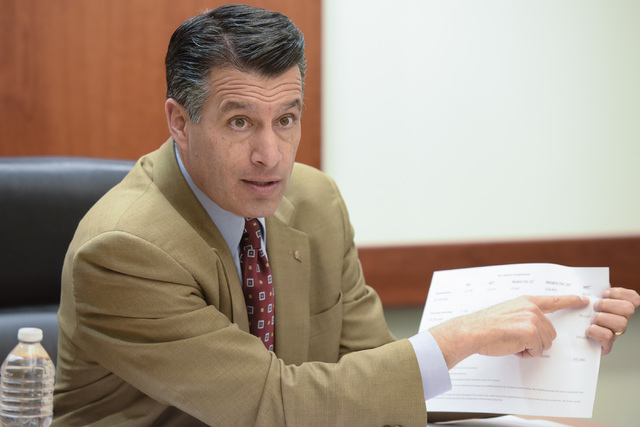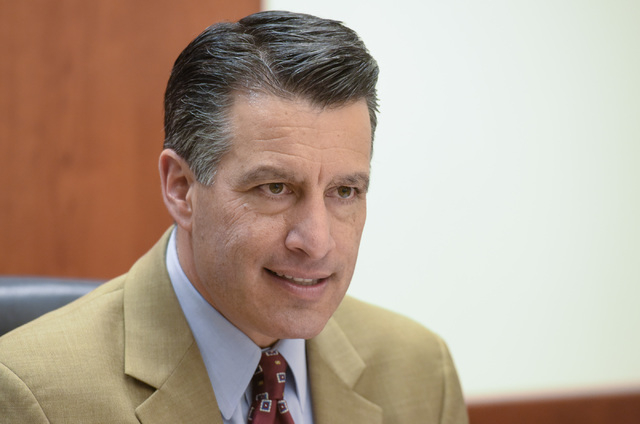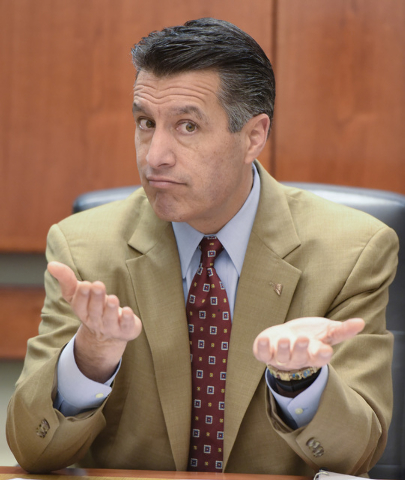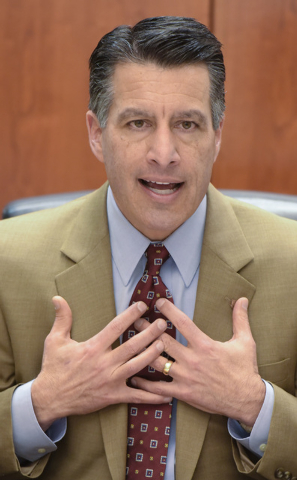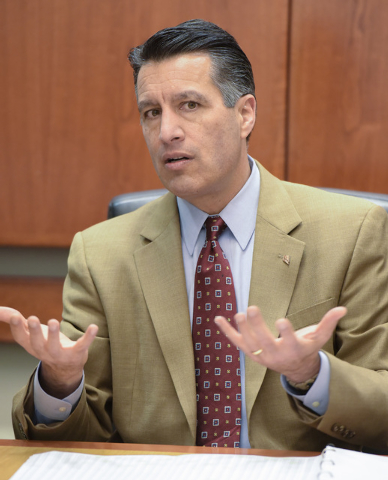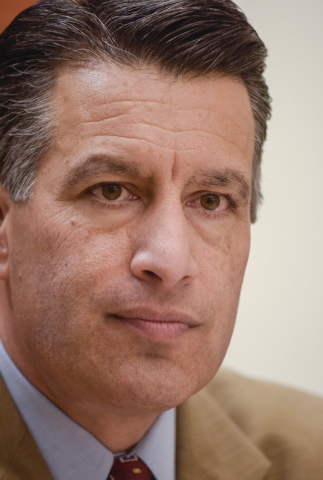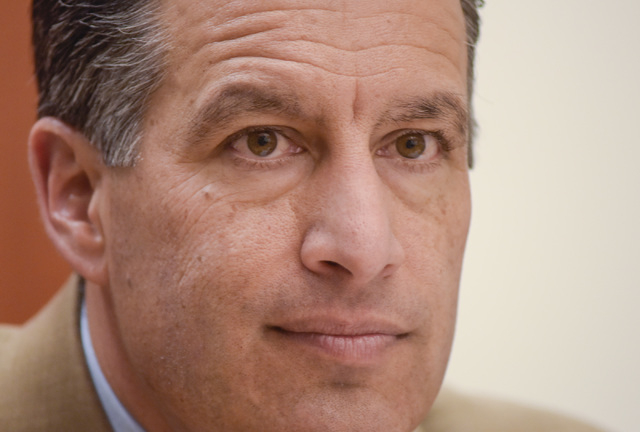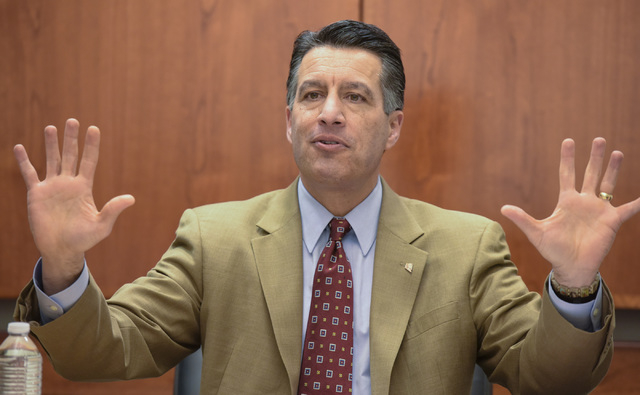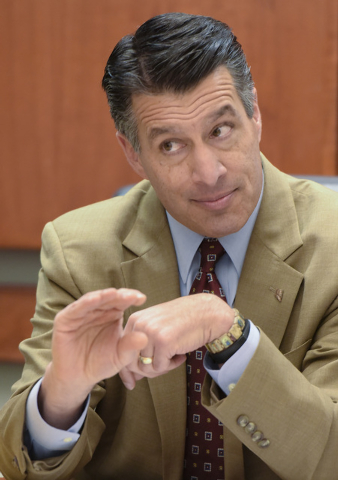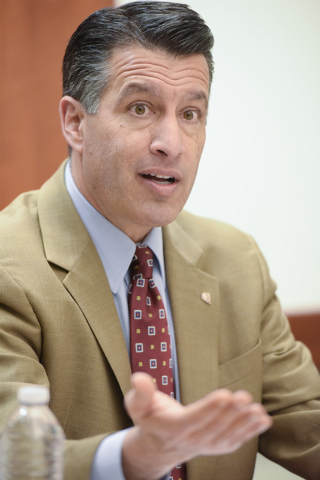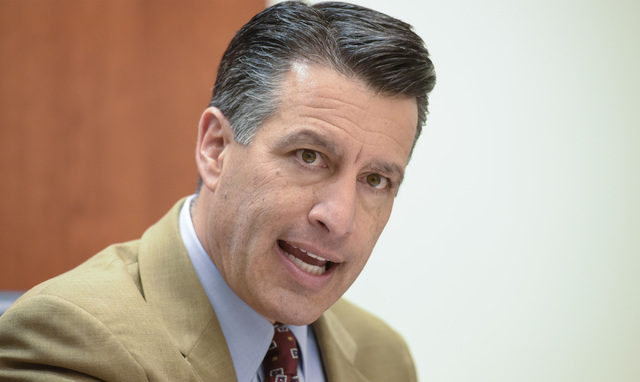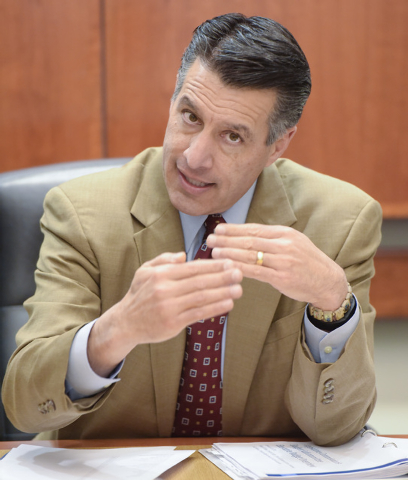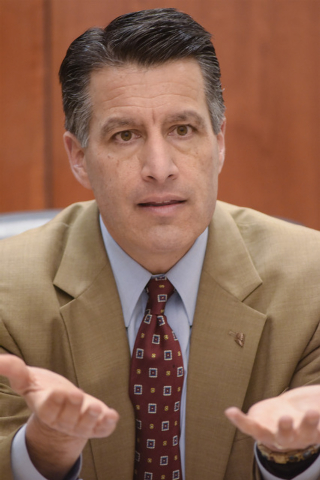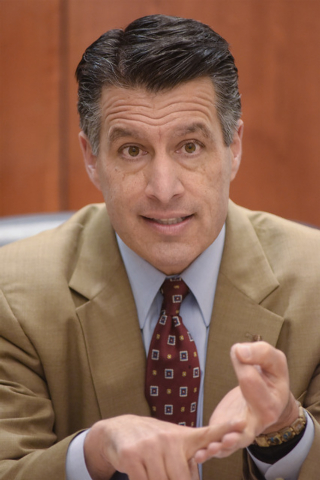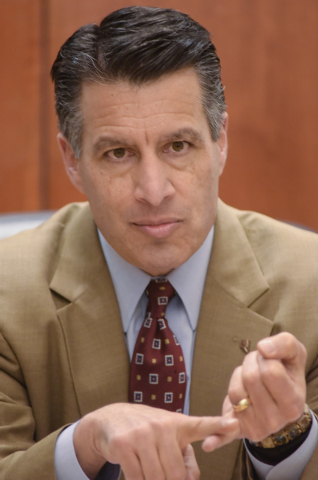Transcript of Gov. Sandoval’s meeting with RJ editorial board
Gov. Brian Sandoval spoke to the Las Vegas Review-Journal editorial board on Friday. He made the case for his $1.15 billion plan to extend taxes and raise business license fees to fund education. Below is an edited version of the editorial board questions and the governor’s replies.
Gov. Sandoval’s opening statement:
Something I’ve been trying to emphasize as I talk to different individuals within the business community and who could be affected by this plan, this business license fee, is to ensure they understand that the two are tied together along with reform and accountability. So there’s really a three-part discussion to be had with regard to what I’m proposing. It starts for me with education in this state.
I don’t think there’s any disagreement that we need to do better. I’m disgusted with our graduation rates being 49th or 50th, depending on who you talk to, with the achievement gaps.
I believe, as I said in my State of the State, our funding model for education is obsolete and antiquated. It was developed in the 1960s when the school population was much different than it is now. We need to modernize that.
I also have a budget issue that I’m staring straight in the face with regard to $150 million hole in this year, the biennium, before we even get to the next one. Gaming revenue being down (1 percent in the state in 2014). It’s significant. And mining is down because of the price of gold. We have 10,000 more students than we expected when we budgeted last time. We have the typical rollups in the budget. These are costs I have to address
There were a lot of things (we had to do) to get us through this recession … to stabilize the budget structure in the state.
Growth isn’t closing that gap. Sales tax revenue, even though it is up, still is below what the economic forum predicted. All those things are starting to cascade in terms of what I’m dealing with the budget.
There’s also this issue of education. I’m as an aggressive reformer as anybody else. I think there needs to be more accountability, more reform within the education system. There needs to be more choice, and that’s within my plan as well. There’s some realities in terms of pre-kindergarten, finishing all-day kindergarten, decreasing class size, having ELL (English language learners) in the classroom — both North and South — the Victory schools, some schools in poverty have the same issues that the ELL schools have in regards to literacy.
There’s the Read By 3 that I talked about four years ago and two years ago. We’re increasing funding on that. There has been a focus on the at-risk schools and students and the English language learners. But the other end of the spectrum has been neglected as well — the gifted and talented, technology. That’s why I put that into the budget. We have an acute issue with bullying in the schools. That’s something I’m addressing in my plan as well. The career and technology schools are doing fabulous in Southern and Northern Nevada. I want to encourage that even more, so there’s funding for that.
There is money in the budget to allow for the best in charter schools to come to the state. There’s the achievement school district — there have been a lot of questions with regard to that. We have 78-80 chronically under-performing schools that have been under-performing for more than a decade. There are resources in the budget to give them another opportunity, but if it doesn’t work out that’s where the achievement school district comes in. You have a charter school operator come in and operate those schools.
Pedro Martinez was the individual I selected to be the superintendent in residence. One of the reasons I selected him is he’s got experience in both Northern and Southern Nevada. As you know, he was the deputy superintendent in Clark County. He was the deputy superintendent and superintendent in Washoe County. One of the issues he was successful in was some of the turn-around schools and improving test scores. He increased the graduation rates in Washoe County.
There is a price for all this. There is a number — $448 million. That’s the all-in cost for all this programming.
I’ve looked at the experience of 2003 and the gross receipts tax and what was proposed there — a 0.25 (percent) across-the-board that didn’t distinguish between the types of business. I looked at what Sen. (Steven) Horsford and Speaker (John) Oceguera proposed in 2011. And we looked at the margins tax that was put on the ballot in 2014 and its effect on business. We looked at the service tax. I’ve read the foundation report from the Las Vegas Chamber. One of the practical issues with the service tax is could you even implement it now. Could I budget on that? The answer is no.
There’s the Modified Business Tax. One out of five businesses in the state pay that. And you could get rid of the exemptions but that still wouldn’t come close to being able to fund what I’m proposing here. There’s a proposal out there to double the MBT. One of my concerns with doubling the MBT is that you perpetuate an inequity within the system. Depending on what type of business you have and income, you may pay more or less with regard to the MBT. We looked at all those things. We have a business license fee in the state — everybody pays $200. The system is in place so you can collect the money right now and allow for the funding of education.
(Refers to the chart)
I’ve met with the heads of the chambers of commerce north and south, I’ve met with business people, I’m meeting with legislators. On this chart you have and X and Y axis. The X axis is the gross receipts. There’s a 15 percent difference amongst the categories, so it allows for growth. That was one of the criticisms in 2003 is that you were taxing every dollar, and this one allows for somebody to grow in between. Across the Y axis is the 30 different types of business.
These different rates recognize that a construction company is different from a mining company, is different from a retail company, is different from gaming. That’s how all those rates are designed and that’s why some are higher and some are lower (determined on different costs of doing business and labor).
You could pay from $400 to $4,285,000. But the highest payer will be gaming with $2.58 million based on accommodations, excluding gross gaming revenue because you’re not going to tax the same revenue twice. We compared this to what you would pay under the 2003 gross receipts tax proposal. We compared this to what you would pay under the 2011 margins tax proposal. We compared this to what you would pay in the 2014 proposal and we compared it to what you would pay if you doubled the MBT.
As I’ve met with business community and gaming, all of them agree that we need to fund education. The disagreement is how we’re going to do it. None of these is going to be perfect. Everybody is going to find a problem with each one of these. In my mind, this (his proposal) is the broadest; nobody gets any exemptions. It is the fairest and it is the simplest.
There’s going to be a proposal out there to double the MBT. There are winners and losers with that proposal. I want this to be fair, to be broad if we’re going to do this.
There is going to be a proposal for a corporate income tax. There is going to be a resurrection of the proposal from 2011. And there’s going to be a different iteration of the MBT based on your cost of payroll, which essentially starts to invite gross receipts analysis into this. You pay a different rate based on what your labor cost is.
Let’s have the debate. Let’s put service tax up there. Let’s put 2011 up there. Don’t put 2014 back up here. Put 2003 up there. Put doubling the MBT and let the chips fall where they may.
We have to make sure we do something for education but also include a reform component and and accountability component and a choice component
If we’re going to do it, let’s do it all. That’s been part of the problem — pieces have been done but not all of it or nothing at all. I’m convinced the status quo is going to fail and it’s going to allow the state to fail. If we’re going to get where we need to go with the types of businesses that are coming here, the types of workforces that we’re going to need, we have to have a more sophisticated student coming out of the kindergarten through 12 system and coming out of the universities.
Review-Journal: When you mention gaming, is that per casino, per corporation; is that broken out?
Gov. Sandoval: It’s broken out. In other words, you couldn’t stack everybody in one so you can avoid the tax. So the equity is still there. It’s per entity, depending on what their revenue is outside of gaming.
R-J: How are you going to get the revised business license fee through the Legislature? There has already been some opposition to what you proposed and outlined Thursday. Is any of that opposition a surprise to you?
Sandoval: That’s part of what I talked about — this hearing process. Let’s put them all up. There are going to be members of the Legislature who just say no and that was part of my proffering. If you are not going to continue the sunsets and if you (are) not going to do what I’m proposing … it will be devastating. You will have to essentially have up to 20 percent cuts across the board. And you can’t do it 20 percent across the board … It will devastate the university system. It will devastate kindergarten through 12. It’s simple to say, “I don’t want to continue the sunsets.” Well then, let’s see what you’re going to cut. You’ve got to look the schools in the eye, you’ve got to look the universities in the eye, you have to provide at least what your vision of Nevada is going to be if you do that.
R-J: Do you sense that some of your opponents on the extreme end are that interested in seeing public education cut?
Sandoval: I can’t speak for them. I only know what I’ve read. I’ve visited over 200 schools, probably closer to 300. I was just at Spring Valley High School for the Teacher of the Year. You talk to the kids. The better person to talk to here is the superintendent … what those kind of reductions would mean. I’m going to meet with Pat (Skorkowsky, Clark County superintendent). I’ve met with the superintendent of Washoe County, and she’s already going to look into what they would have to reduce. You can only put so many portables on a campus. You can only cram so many kids in a classroom. Ask (my opponents). Tell them to put up. I’m putting up. I feel in my heart this is the right thing to do for the state. We can debate on whether that is the best way to spend the dollar.
There are studies on everything. We have to do something. I’ve assured the business community that every dollar raised I’m going to make sure that it is spent well, that it is accounted for. All this money that is raised in going to be outside of the DSA, so it’s not going to be subject to collective bargaining. It’s important for me that the dollars I’m asking from the business community to do this go directly to the programming that I’ve suggested.
R-J: Do you believe the business community will be more receptive to the business license fee proposal now?
Sandoval: The economy … I didn’t think (2013 or 2011) was the right time. We had 14.5 percent unemployment four years ago. Two years it was 10 percent. Now it’s 6.8 (percent). Business is improving, and frankly that’s been the conversation with the business community — that we are in a better position to do this. We want to make sure it is fair.
In 2003 it was that margins tax. It had that flat rate, and businesses didn’t think it was fair. And there are some who just don’t want to pay. I’ve had those conversations as well. (They say) “Just do a service tax. Just pass it on.”
R-J: One of the most vocal complaints from some businesses is the similarity of the business license fee to Question 3, that money-losing business will still be subject to this new fee based on revenues. Their concern is that it has the potential to cost jobs, perhaps make a business unviable. How do you respond to that?
Sandoval: Two ways: If you double the MBT (Modified Business Tax) you have the same problem. I think the only way to address that is to have a corporate income tax. Nobody wants that. Whatever regime that is out there is still subject to that critique.
R-J: When you were sitting down with your staff and advisers and formulating this plan, how did you talk about it, knowing you were going to be criticized for its similarity to Question 3?
Sandoval: One thing is the rate, and the rates aren’t even close. I said this privately to some of these folks when I would campaign against Question 3. I would get pulled aside almost without exception, (and they were) saying, “Governor, we know this is way too high, but we know we need to do something.”
R-J: In the 2014 campaign, the business community had no problem finding people to dump a lot of money into the anti-Question 3 campaign. People who weren’t public figures emerged as public figures in the media. Are you going to be able to find a similar group of businesses and high-profile people to take to the airways for you in support of the business license fee?
Sandoval: I do think there is consensus out there that we need to do more for education. There is disagreement on how to do it. And that’s why I circle back in terms of put it on the board. Let’s put it all on the board, but let’s agree we all need to do more for education. It has to include accountability. It has include reform. It has to include choice. That’s the other piece to what the business community says. “We don’t to put more money into it unless we can get some of these reforms as well.” It’s kind of interesting to me because I’ve heard it four different ways: This is an income tax. This is a gross-receipts tax. This is the 2011 margins tax. This is the same as the 2014 Question 3. There are components in (the business license fees) that are similar, but there are different rates, so it is not the same. That’s why I think it’s important to emphasize that we took those criticisms into account when I met with my staff and advisers to try to craft the fairest, the broadest and the simplest.
R-J: So you think this minimizes the pain and spreads it?
Sandoval: I do. Nobody is out. Four out of five businesses in Nevada don’t pay MBT.
R-J: What is it about this plan that convinced you that it spreads it, it minimizes it?
Sandoval: Because it’s fair. As I sought feedback, if you’re going to do this make sure nobody gets out or gets a special deal. So nobody gets special treatment in any of this. And the rates are a lot less – significantly less – a than what was in 2014 (Question 3). In 2011 it was 8 percent — significantly less than 2008 and less than 2003. The other important point it that it allows for growth moving forward. That’s why you have that 15 percent growth factor. It avoids having to confront this issue two years from now and four years from now. We tried to anticipate every different issue. As I meet with the business community, some good points have been brought up. I met with some fuel guys and they said, “Governor, my gross-receipts are going to be way down here when gas prices are $4 a gallon, and now it’s $2 a gallon and yet I’m making the same amount of money but you’re going to tax me a lot more.” That’s a fair criticism. So we’re going to take that into account as we move forward. That’s why I’m meeting with the business community, to try to capture some of these issues that are meaningful.
The insurance industry — you don’t want to double tax them. They pay that insurance premium tax. Just like the gaming industry shouldn’t be taxed on their gross gaming revenues. It also considers what is called pyramiding. One of the criticisms in 2003 was that you tax the manufacturer, you tax the wholesaler and you tax the retailer. … This considers all that and adjusts the rate for that.
R-J: Do you think you can count on the support of Democratic lawmakers and the moderate Republicans?
Sandoval: The meetings have been positive, and the (legislative) session hasn’t even started. My conversations on it are there’s a general recognition that we need to do something for education, but there is going to be a debate on how to do it.
R-J: When did you start work on this plan, and how do you respond to those criticizing you because you did not run on this?
Sandoval: I don’t have an exact date. I told you I was going to look at the revenue structure so that the next governor wouldn’t have to keep going through what I have had to go through during my tenure as governor. But I also told you I’m not going to give it all away. There have been a lot of iterations as we learned … in doing our due diligence. We looked at Texas. There has been litigation with regard to what the rates were. We get the benefit of that experience. We were looking at everything. I was aware of the service tax. Chris (Nielsen) is the former head of taxation, and he’s now my deputy chief of staff. I sat him down and asked him if the service tax is realistic. He told me, “No.” He said there’s no way to determine how much we need to raise. Before the election, I didn’t know what the economic forum was going to report. I didn’t have final input from my Cabinet. They came to me with $8 billion of budget requests. I cut that down to $7.3 million. So there were some pretty tough decisions to be made before I even got to the starting line on this. And part of the design of this proposal was to meet with the new spending on education so the business community would know exactly how that money is going to be spent.
R-J: When you met with us in October you said you wanted to take a look at the property tax caps. As I understand it, the caps were made of increased property tax and are not part of your plan. Why did you decide that?
Sandoval: First, because I know there’s going to be legislation, and second, because I’ve got a lot on my plate here in terms of what I’m trying to accomplish. That’s why I’m not taking every single reform bill, because I know that some of those bills … the construction defect bill is going to come out of the Assembly. There’s going to be discussion about prevailing wage. There’s going to be discussion about Chapter 288, collective bargaining.
R-J: You expect the Legislature to take on the property tax cap issue?
Sandoval: I do.
R-J: What about the slot machine route operators levy?
Sandoval: Those are the other components. There’s an increase from mining to take (it) from 0.17 to 2.0 on the MBT. There is an increase in the cigarette tax. And then there’s a slot route issue. Part of this is making sure the taxing policies are consistent. And there are some out there that have thousands of slots but are still taxed on a restricted rate, and it is making that fair.
R-J: Has that proposal been put together yet?
Sandoval: It’s in the budget. I’ve met with Blake Sartini, Craig Este, Herbst. I’m not going to blindside anyone with any of this. I’m not going to name names, but there was a mixed reaction to that.
R-J: Did you think about the political implications? You are one of eight Republican governors across the country proposing tax increases.
Sandoval: I have to embrace the moment. We’ve done the cuts. I’ve done the consolidations. We’ve done the sweeps. And I did make up my mind that I’m not going to move backward anymore. And I also made up my mind that I’m not going to put a future governor through this. I could have gone the other way, and I could have cut K-12. I could have cut the universities, I could have continued the furloughs, could have continued to reduce state employee pay. I’m not going to do that. There’s an opportunity for me to stabilize tax policy in the state. Because if you continue on this road the next governor is going to be in the very same place that I’m in, but it’s going to be worse. And you haven’t built that workforce, you haven’t improved our education to meet this new economy that I am trying to build, to diversify the state. I don’t know what the political implications are going to be, but I know in my heart that it’s the right thing for the state. It is no fun to go into a room like this full of business people and show them that I’m going to increase your taxes. But they do recognize that we need to improve education. Somebody has to take this on. I’m a governor. I have to lead and I will lead. And I’m going to defend this. If there are other good ideas out there, I’m willing to listen.
R-J: Does the Clark County School District have the classroom space to expand all-day kindergarten and pre-kindergarten and install the programming you want?
Sandoval: Within that money to complete all-day kindergarten is money for more portables. But that brings us to the bond rollover. And as I said, you can only stack so many kids in a classroom and on a campus, and you can only stack so many portables on a campus. I know I’m going to support this because you know who gets punished? The students. And I’m not going to allow it to happen. All these things I’m proposing are not going to work if there’s not a good learning environment (with) 40-plus kids in a classroom.
R-J: In your State of the State address you had a lot of surprises — a bold departure from past speeches. How long have you been thinking about this plan?
Sandoval: I’ve been thinking about this since before I was elected in terms of best practices. There are so many variables that you can’t say there was one single moment. The opportunity scholarships are something I proposed the last two sessions that haven’t been heard. In both of the budgets that I have submitted, we have not reduced the per-pupil funding. The first one had some cuts, but we got some more money at the end and were able to spend more. I’ve always wanted to do the most that I can for kindergarten through 12, but you have to balance that what’s going on in the economy and people who aren’t working. There was an opportunity here to get this done. These are things I think are going to improve education in the state.
R-J: You say you have to live in the moment. Have you been out there laying the groundwork?
Sandoval: I had conversations with the business community, and we were taking about this margins (tax), Question 3. They tell me, “We hate this, governor, but we would be supportive of something.” They never said what the something is. I’m not going to call them assurances. I think there’s general consensus. The business community wants to do more for education. Now we’re getting to the details. And we’ll see who runs for the hills and who doesn’t when the session starts. I’m not.
R-J: You have talked about tax reform. Does it complicate things for you this session to have some lawmakers who believe they have a mandate to do one thing and others, Republicans, who think they have a mandate to do another?
Sandoval: It may, but as I learned, and as every candidate learns, being a candidate and governing are two very different things. I think some of these individuals are going to learn about the budget, and it’s not so easy to say, “I’m not going to continue the sunsets, I’m not going to do this because there are consequences.” I think there is going to be a process that people ran on different things, now they’re going to hear what the budget is really about. They are going to hear all the issues, and it may change the calculus a bit.
R-J: Speaking of budgets some businesses’ fees are going to go up substantially. What do you say to them?
Sandoval: I talked to a businessman (Thursday), and I don’t know what the difference between what he pays on the MBT and what he will be paying under (my proposal). He’s going to do an analysis, but it’s going to go up. But he said, “Governor, we have to do this for education.” That has been the general consensus. Gaming has said we’re OK with this even though we are going to be the highest payer because we know this has to be done. Those who will be paying more under this just want to make sure that it’s fair and that it’s broad-based.
R-J: How confident are you that this will be “the fix” and not pushed on to the next governor?
Sandoval: I don’t have a crystal ball. This will help. We don’t have a broad-based business tax, and the tax structure that we have right now isn’t keeping up. Even though sales taxes collections are up, proportionally we aren’t collecting as much. … As I said in the State of the State, the general fund now is the same as 10 years ago. We have 300,000 more people, 50,000 more students. If you stick with the status quo and you do the math — we are the second fastest-growing state in the country right now — you stick with status quo on our revenue structure, the next governor’s going to have a huge budget deficit unless we try to correct it now. How confident am I? I don’t know. I’m going to work hard to get this done and make my case, just like I am today. I think there are a lot of reasonable legislators who will agree.
R-J: Are there a couple of things you look at that are above the others, that are most important?
Sandoval: I have two responses. Strategically, it would be like the Seahawks showing their playbook to the Patriots. Secondly, I’m not going to pit kids against kids. I’m not going to pit special education kids against kids in kindergarten. I’m not going to pit kids in ELL against gifted and talented. I’m not going to pit more technology in the classroom against kids in poverty at Victory schools. So they are all important, and I’m going to fight for all of them equally.
I know there are questions with regards to pre-kindergarten. And there’s a lot of literature out there that says it’s great. You have literature that says otherwise. Let’s talk about it. There’s literature out there in terms of all-day kindergarten doesn’t make (more of a) difference than half-day kindergarten. There’s plenty of literature that says otherwise. There’s literature out there that says ELL doesn’t work. I think that’s how people will go about it — to say that doesn’t work, let’s get rid of that. It’s my job to support and defend that, along with the state superintendent, along with the 17 superintendents across the state, why that will work. These new schools are proving out. I wouldn’t have doubled the money in that if it wasn’t a working model. The burden of proof is on me.
R-J: What about the immigration lawsuit the attorney general filed? What’s the harm in filing a lawsuit?
Sandoval: I think it’s a legislative fix. All these issues need to be on the table.
I don’t know if it (lawsuit) adds pressure. I didn’t have the conversation. I couldn’t talk about it. We (the attorney general and governor) have spoken. We met in my office (Thursday) morning.
R-J: Have you had any conversations with labor leaders in Nevada, and have they expressed to you how far they are willing to go to try to stop some of the bills that might be introduced in the Assembly?
Sandoval: I’ve talked to labor leaders. … I’ve met with some of the education labor folks and we’re going to continue to have conversations. Obviously, there’s a lot that they liked and a lot they didn’t like. I’m not afraid to be with anybody. That’s what this is about. One of my big criticisms in (the) past two sessions is saving these heavy issues until the last two weeks. And there is no meaningful debate or analysis or discussion. That’s why I’m out there, meeting with these different business entities, to take this one, to talk about the labor issues.
R-J: You still have one more session (as governor).
Sandoval: It will be the same thing all over again. And as I said in the State of the State, you suddenly have thousands of kids that move through that get punished. And we’re two more years behind in terms of preparing for these great companies that are coming here. We can’t wait. I want this out there. I want it to be debated. I want you to criticize it. Let’s talk about it. Let’s work it out, but let’s do something. You’re not just going to reform your way out of it.
I am speaking to Senator (Aaron) Ford and (Minority) Leader (Marilyn) Kirkpatrick. Obviously I’m meeting with Senator (Michael) Roberson and Speaker (John) Hambrick. I’ve been talking with them since the election to get a feel for the lay of the land. It shifts constantly. It’s been positive conversation. For the most part, the majority of legislators know that this is a generational opportunity to make a difference. There are going to be some who don’t — just say no. That’s the beauty of the Legislature. There’s a consequence to not only do nothing but to go backward.
R-J: Did you ever imagine the biggest critics would be in your own party?
Sandoval: I knew there was going to be criticism, but I have to do what’s right for the state. I don’t know what that means to me a year from now, two years from now. I hear it. I’ve been here for four years now. I know where the state is. I know where the educational system is. I know where our budget system is. I have to do what (I) think is the best in my heart for the state of Nevada, and that’s what I’m going to do.
RELATED
Sandoval: Pass education tax plan or see 20 percent cut in state budget



